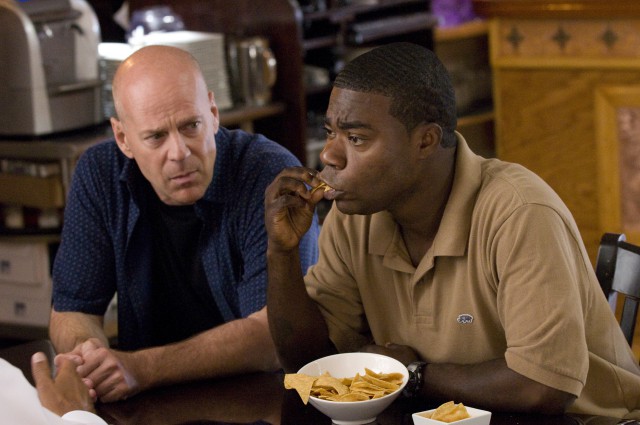
Distilled to its manly essence, the cop-buddy movie
— a la “Cop Out,” which opens Friday — is about opposites not
attracting: Two characters, almost always male, approach each other
warily from different racial, ethnic, political, temperamental,
psychological and criminal backgrounds. They don’t get along. They
can’t get along. And then, of course, they fall in love.
No? Didn’t
The latest suspect in the police lineup, “Cop Out,”
is a big movie. Everything about it is Big. Or used to be: Just last
week, its director, the countercultural
the latter best known for “Saturday Night Live” and “30 Rock”; the
former for having been so big that at one time he could do a cop-buddy
movie without a buddy (the “Die Hard” franchise).
That was, of course, some time ago. For the macho
career on the ropes — or, apparently, the aging maverick who wants to
go mainstream — there exists the default mechanism of the buddy-action
flick.
They’ve all done ’em: Stallone,
franchise (“Beverly Hills Cop” and “48 Hrs.”). Willis is actually
coming back for seconds, having done “The Last Boy Scout,” which wasn’t
actually about cops, but had all the right stuff.
But so do many
pictures — to the point that the cop-buddy formula might be considered
representative only of what makes mainstream movies work at all:
Conflict. If someone wanted to remake, say “The African Queen,”
couldn’t
Where the cop-buddy movie does push things forward
is in matters of race. Few genres have been so regularly, insistently
diverse about pairing black and white — Glover-Gibson; Murphy-Nolte
(“48 Hrs.”),
But the examples of Caucasian cop comedies —
black-on-black pairings (“Bad Boys” I and II) or, given the resilience
of the “Rush Hour” machine, the Chinese/African-American combo platter.
Mixed-race cop teams are a safe way of pursuing
diversity (and a larger audience) because race is seldom the core issue
of dispute between the principals. Their friction is usually more about
lifestyle — Glover’s grounded family man vs. Gibson’s suicidal lunatic;
Murphy’s street-wise
Sometimes the partners seem like different species. Sometimes they are (Hanks and the dog in “Turner & Hooch”).
Usually, though, it’s all about worldview, not genomes.
For all the vulgarity, violence and imminent disaster of the cop-buddy movie, it’s not danger that’s being peddled.
Quite the contrary: Formulas get repeated because
they work, and anyone who’s chomping at the bit to see “Cop Out” will
be expecting — and wanting — the tried and true.
Besides, the cop-buddy movie is such an entrenched
part of our moviegoing culture that any tampering with its tropes and
conventions would probably be considered a Class A movie felony.
The sentence: back-to-back showings of “National Security” (
Kevin Smith plays the relationship card in ‘Cop Out’
“‘Cop Out’ is basically about two guys sitting
around talking, which is something I know a little something about”
says director
“Clerks” remains one of the more vulgar, and vulgarly hilarious, debuts
in the history of independent film. But how does a regular-guy-type guy
like Smith, whose repertoire includes “Zack and Miri Make a Porno,”
standup comedy, film producing and ownership of a comic-book store in
“
Cullen brothers, which it was. But I thought it was a goof. Then I get
a call from Jeff asking ‘Did you read the script?’ I said, ‘What
script? That was from you?'”
At first, Smith was a bit out of his depth, he
admits, regarding the action sequences. Still, the heart of the film,
he said, is the relationship between the two principal NYPD cop
characters on the hunt for a rare baseball card — Jimmy (
“Just the way Lucas and Spielberg remade the films
they’d grown up with, I wanted to make a cop-buddy movie,” he said.
“I’d watch them growing up and say, ‘They should have done this, they
should have done that.’ This was my chance to do it the way I wanted.”
—
(c) 2010, Newsday.
Visit Newsday online at http://www.newsday.com/
Distributed by McClatchy-Tribune Information Services.














